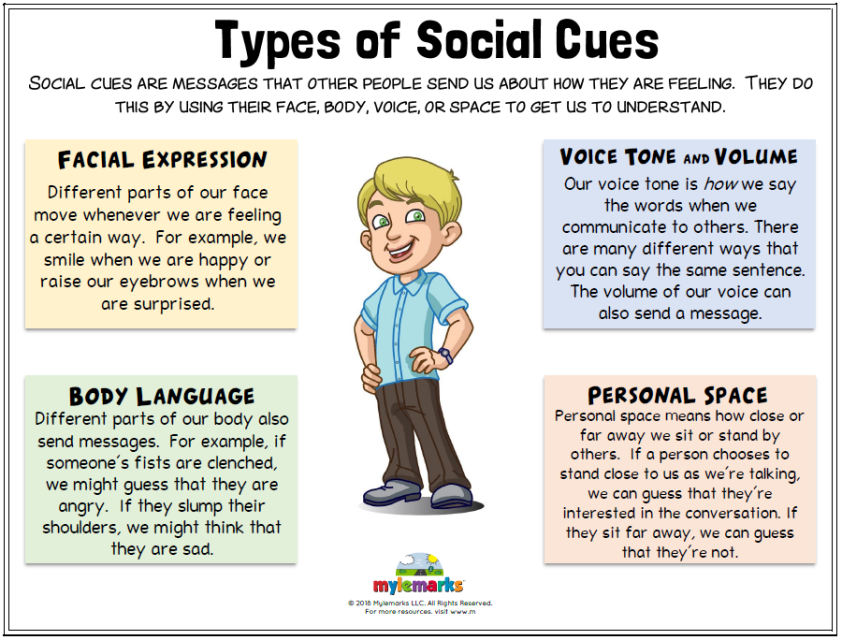Best questions to ask a psychologist
The 14 Questions You Should Ask a Therapist Before Your First Appointment
Health
Only about half of Americans diagnosed with major depression receive treatment for it, according to a 2010 survey supported by the National Institute of Mental Health. There are a wide variety of factors for that shocking number, including cost, availability, and access, but it certainly doesn’t help that finding a good therapist is a challenging and anxiety-producing situation.
To lessen that apprehension find out whether a therapist’s professional style and approach will help you achieve your goals before you lie down on the couch for your first full session. Think of hiring a therapist like buying a new car or house—you have to do your research. And the more research you do, the more comfortable you’ll feel during therapy, and the more likely you’ll be to stick with it.
Most therapists offer a 15-minute consultation where you can explain your objectives and ask them questions. Here are the top questions you should ask a therapist before making an appointment.
Basic Questions to Ask a Prospective Therapist
It’s often uncomfortable to talk with a physician about cost or their credentials—but both those topics can have a momentous effect on your ability to continue to seek treatment and the trust you place in your provider. Plus, any therapist worth their salt will be happy to openly discuss pricing, insurance, and other practical matters. After all, if you’re stressed about making payments, you’re only adding to your troubles.
- How long have you been practicing?
- What licenses and certifications do you have and which professional organizations do you belong to?
- How much do you charge? What are you sliding-scale options?
- How many clients have you had with similar circumstances to my own? When was the last time you worked with someone similar to me?
- Describe your ideal patient.
Is This Therapist a Good Fit?
It’s important to find a therapist that meshes with your personality.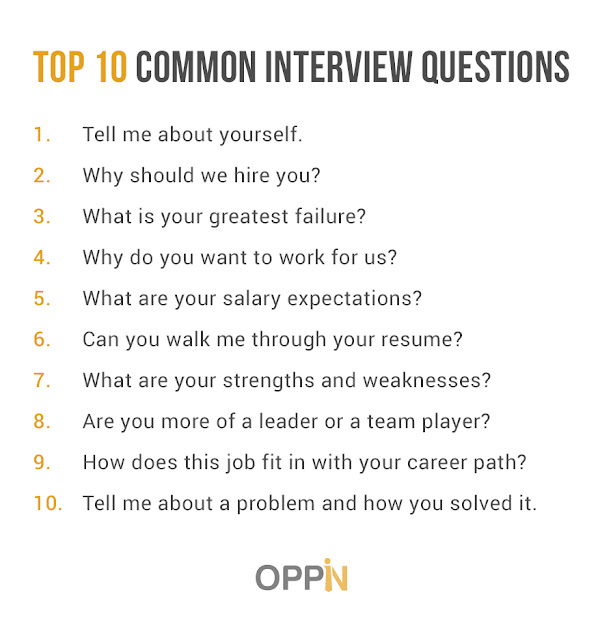 If you’re nervous about starting therapy, perhaps a more guided approach to meet your goals is best. Or, if you’re a therapy veteran, maybe a direct route is appropriate. And don’t be afraid to ask a potential therapist about their own personal experiences with therapy—a good therapist believes in their field and knows what it’s like to be the one lying on the couch.
If you’re nervous about starting therapy, perhaps a more guided approach to meet your goals is best. Or, if you’re a therapy veteran, maybe a direct route is appropriate. And don’t be afraid to ask a potential therapist about their own personal experiences with therapy—a good therapist believes in their field and knows what it’s like to be the one lying on the couch.
- What are your strengths and limitations as a counselor?
- What is your general philosophy and approach to helping? Are you more directive or more guiding?
- Have you been in therapy yourself? How recently?
- How often do you seek peer consultation?
Setting Goals For Therapy
Congratulations! You’ve passed the first hurdle—seeking help. That’s a big deal, and you should be proud of yourself. Now you need to jot down some goals to discuss with your potential therapist so you can continue to jump those hurdles going forward. By creating goals, you increase the value of your time in therapy and set yourself up for success!
- How often would you anticipate seeing me? For how long?
- How do you set up counseling goals? What are they like? What is success for you?
- What is typical session like? How long are the sessions?
- What kind of homework/reading do you give patients?
- How do I prepare for my first session?
Mollie Bloudoff-Indelicato
Mollie Bloudoff-Indelicato is a freelance science, health, and environment reporter based in Washington, DC, whose work has appeared in National Geographic, NPR, Scientific American, The Atlantic, Newsweek, and Nature.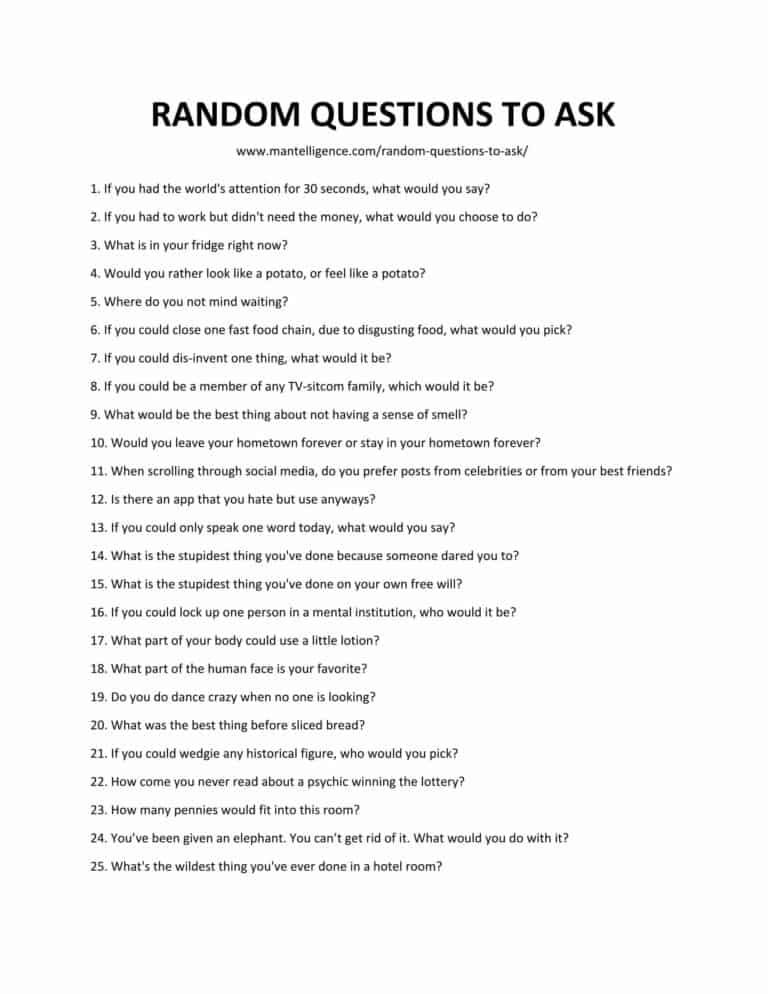
Best Questions To Ask A Psychologist On Mental Health Disorders In 2020
Are you going to meet a psychologist in the near future, but stuck on what questions to ask a Psychologist?
Do you know, Over 9 crore Indians, or 7.5 percent of the country’s population of 1.3 billion, suffer from some form of psychological issues, according to the World Health Organization(WHO) report.
However, the percentage could be much higher, as suggested by the findings of a countrywide 2015-2016 study by India’s National Institute of Mental Health & Neurosciences (NIMHANS).
There are several types of psychological issues like; Mental Health, Depression, Anxiety, ADHD, Autism, or not able to choose the best career. Then you must consult a psychologist near you or online.
But the point is If you are stuck on what questions to ask a psychologist; then you’re at the right place. In this post, we are going to tell you what questions to ask a psychologist on different kinds of psychological disorders.
The mind is a vital part of the human body, which means everyone must eat a healthy diet, follow exercises, or yoga on daily basis to safeguard mental health from disorders.
As per the Global Burden of Disease report for mental health in India, mental disorders account for 13% of total diseases found in any human being.
You should know that one in seven Indians were affected by mental disorders of varying severity in 2017.
So, If you think you are facing a mental health disorder, then…
Questions to ask a Psychologist on Mental Health
1. What causes mental health disorders?
2. What are the symptoms of a mental health disorder?
3. How can mental health struggle manifest me physically?
4. How can mental health affect my sleep?
5. What kind of lifestyle changes can help with my symptoms of mental health disorder?
6. What might progress with my mental health look like?
7. Are there any topics of conversation I should avoid?
Are there any topics of conversation I should avoid?
8. Are there any behaviors I can change to avoid causing further harm?
9. What is the general time frame in which most patients see results?
10. What is the best way to improve my mental well-being?
11. What should I do in a mental health disorder emergency?
12. Will the psychologists prescribe me medicines?
Infographic explaining the main causes and symptoms of a mental health disorder:
2. Depression:
Depression is a major health problem and we feel weakness or negative personality conditions.
As per the World Health Organization report worldwide more than 264 million people are affected with depression. It can lead to suicide and close to 800 000 people die due to suicide every year.
Between 76% and 85% of people in low- and middle-income countries receive no treatment for their disorder. 43 percent of Indians suffer from depression, according to a new study.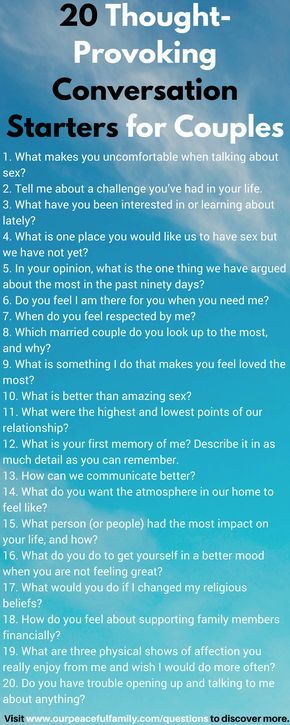
Conducted by GOQii, a smart-tech-enabled preventive healthcare platform, the study surveyed over 10,000 Indians to understand how they have been coping with the new normal.
So, If you think you are facing depression, then…
Questions to ask a Psychologist on Depression:
1. What causes depression?
2. What are the symptoms of depression?
3. What kind of depression do I have?
4. How might depression affect my appetite and weight?
5. How could depression affect my sleep?
6. What kind of lifestyle changes will help with my symptoms of depression?
7. Is depression hereditary?
8. Do I need medicine to treat my depression?
9. Do the symptoms of depression need special treatment?
10. What should I do in a depression emergency
Infographic explaining the main causes of depression:
3. Anxiety:
Are you worried about each and everything that happens in your life? If it’s happening on regular basis then it can be a symptom of anxiety.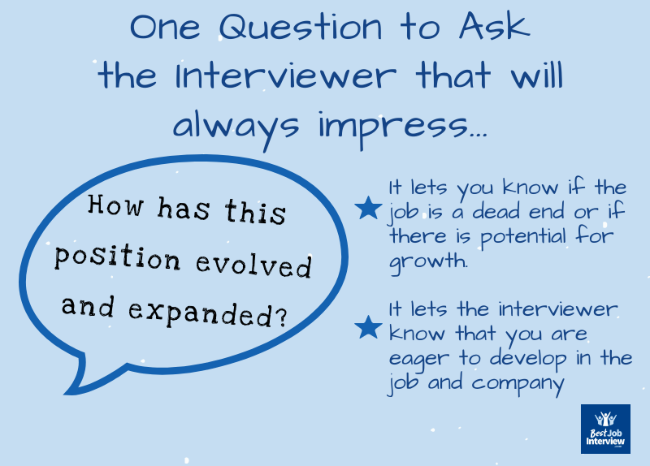
According to a study in 2017, an estimated 264 million people worldwide experienced anxiety disorders and across the world, it varies from 2.5 to 7 percent by country.
So, If you are unable to live your life up to the mark you have imagined; then please consider consulting a Psychologist.
However, here is a list of questions to ask a psychologist about anxiety.
Questions to ask a psychologist on anxiety:
1. causes anxiety?
2. What are the symptoms of anxiety?
3. If anxiety occurs too often then will it have harmful effects on my body and life?
4. How to stay socially active during anxiety?
5. How to change my attitude towards people around me?
6. Will medicines be prescribed to me?
7. How often, I should exercise or Yoga?
8. What type of diet, I follow to keep my mind and body active?
4. ADHD:
People with ADHD may have trouble paying attention, controlling impulsive behaviors, or being overly active. Although ADHD can’t be cured, it can be successfully managed and some symptoms may improve as the child ages.
Although ADHD can’t be cured, it can be successfully managed and some symptoms may improve as the child ages.
The estimated number of children ever diagnosed with ADHD, according to a national 2016 parent survey, around is 6.1 million affected by ADHD.
This number includes 388,000 children aged 2–5 years. 2.4 million children aged 6–11 years(SOURCE of this study). ADHD is not curable However, it can be improved by consulting a psychologist
Questions to ask a psychologist on ADHD:
1. What is ADHD?
2. How is ADHD diagnosed?
3. What causes ADHD?
4. What are the symptoms of ADHD?
5. What other conditions can occur with ADHD?
6. Does ADHD need medication, or can it be treated effectively without it?
7. When can my child expect to notice improvements in how he feels?
8. Is there a medication that my child can take on an as-needed basis, such as when he needs to focus or concentrate?
9. How does ADHD affect an adult’s work or job?
10. How effective are medication-free treatments?
How effective are medication-free treatments?
11. What could the workplace or my employer do to help with my ADHD
Infographic explaining how to manage your kid’s ADHD at home:
5. Autism:
Are you facing challenges with social skills, repetitive behaviors, speech and nonverbal communication? It can be a symptom of autism.
According to a world health organization report worldwide, one in 160 children suffers from ASD. So if you are thinking to consult a psychologist then,
Questions to ask a Psychologist on Autism:1. What causes autism?
2. What are the symptoms of autism?
3. What other conditions can occur with autism?
4. How can I encourage communication skills in my child?
5. Are there ways to help my child get more sleep at night?
6. What are my child’s strengths and how can they be maximized?
7. How can it be diagnosed?
8. What kind of medicine will be prescribed by the Doctor
So in this post, you have learned the most asked questions to a psychologist about different kinds of psychological issues that people face often.
Please keep in mind that the relationship with the psychologist is strictly ethical and professional and aimed towards treatment. If there is a breach in boundaries, the therapist is at liberty to terminate the therapeutic alliance.
10 questions to a psychologist that everyone would like to ask, but are embarrassed to ask
The decision to seek help from a psychologist is not easy for many. Often people are not ready to hear the truth, take action to improve the situation, or take responsibility for themselves. For this reason, some problems remain unvoiced. Daria Milay, a clinical psychologist, psychotherapist, author of books and a number of innovative psychotherapeutic methods, spoke about the most popular client requests at a psychologist session.
It seems to me that I am not living my life
A person feels that he is going to the wrong job, is engaged in an unloved business, is married to the wrong partner. There are many such doubts. But people are afraid to go to a psychologist with a problem because of the fear that they will have to take some action, strive for other goals. They are not ready to live according to new guidelines.
Legion-Media.ru
How to quickly learn to relax?
A very relevant request, despite the fact that people are afraid that they will have to work on themselves, reformat their scripts. Of course, during the session, a person will certainly relax, because for this he came to a psychologist. But outside the office, he remains alone with himself.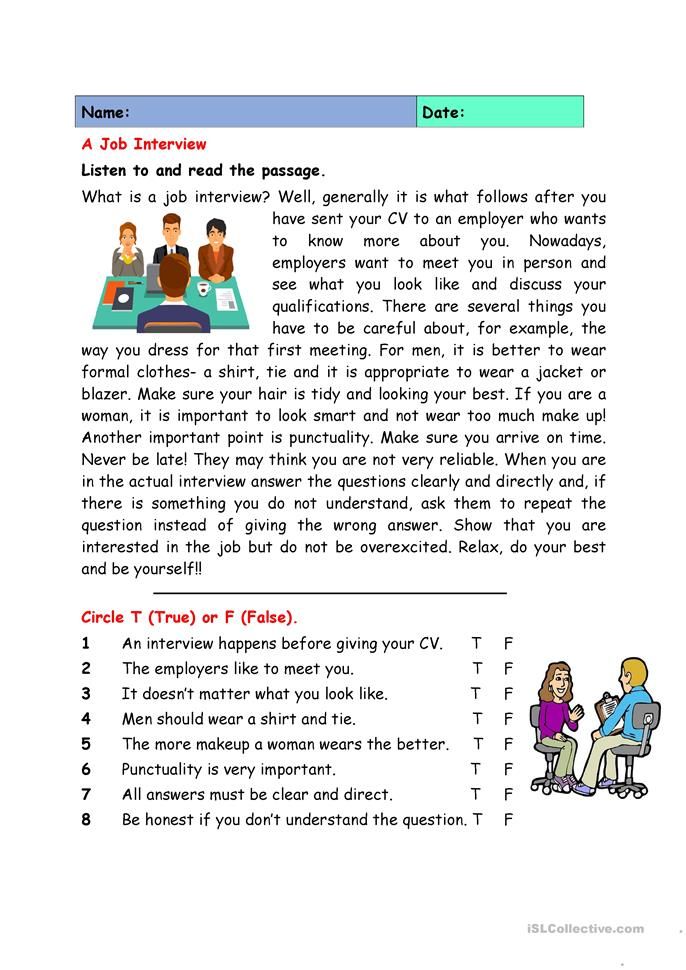 And if he does not take care of his body, work with the psyche, then diseases, panic attacks and other health problems will not keep you waiting.
And if he does not take care of his body, work with the psyche, then diseases, panic attacks and other health problems will not keep you waiting.
Legion-Media.ru
How to part with a woman or a man so that he continues to love me?
People themselves tend to control the person with whom they would like to break off relations. They do not accept the fact that someone accepts their own choice, and they try to manipulate others. This request appears due to the fact that a person is accustomed to "go with the flow", to be led. He does not have his own vector in life, which is why it is so difficult to make a choice yourself and take responsibility for it.
How do I leave a person I don't want to leave?
Another example of a codependent, toxic relationship. Suppose a partner can be physically, psychologically and emotionally abusive, but the person does not want to leave him. Such clients do not find satisfaction from working in a session with a psychologist, as they are not ready for change and just want to complain.
Suppose a partner can be physically, psychologically and emotionally abusive, but the person does not want to leave him. Such clients do not find satisfaction from working in a session with a psychologist, as they are not ready for change and just want to complain.
Legion-Media.ru
How can I become confident and successful when there are so many bad people in this world?
A person who has such a question takes the position of a victim. He is used to blaming others for everything. The session with him takes on a pitiful format. He is afraid of a counter question from a psychologist: what did you do so that everyone around ceased to be. Such clients want to be pitied and are not ready to hear a truthful answer.
Legion-Media. ru
ru
How to stop feeling and start living?
People who ask this question are highly sensitive. They drown in their own feelings and react sharply to events with tears, tantrums. High sensitivity cannot be called a negative quality. But it is important to apply yourself correctly, to increase emotional intelligence. This is a long internal work, a process in which people feel uncomfortable because they have to work hard.
Legion-Media.ru
How to stop getting irritated so as not to provoke a partner?
This is just one of the examples of requests where a person believes that the problem is only in him. For example, a husband beats and humiliates his wife. But she does not admit his guilt and believes that she herself provokes her partner to unworthy actions. The woman does not understand that she is living with an abuser, and the problem is not in her at all. But she is afraid to hear the truth from the psychologist. In this case, you will have to take responsibility for your life and, possibly, decide on a divorce.
But she does not admit his guilt and believes that she herself provokes her partner to unworthy actions. The woman does not understand that she is living with an abuser, and the problem is not in her at all. But she is afraid to hear the truth from the psychologist. In this case, you will have to take responsibility for your life and, possibly, decide on a divorce.
Legion-Media.ru
Give me proof!
The category of clients with such a request is fond of psychology and believes that they know everything in this area. There is a competitive moment. Armchair criticism leads people to try to prove their professionalism without having any reason to.
Legion-Media. ru
ru
How to keep up with everything and be perfect?
People with such a request are perfectionists. Like A students in school, they strive to be perfect in everything. But we cannot be permanently strong and successful. Illness, fatigue, lack of sleep cause a wave of emotions in us. In an effort to do his best and keep up with everything, a person runs the risk of disconnecting from his own needs, feelings, turning into a robot that will not be interesting to others.
Legion-Media.ru
My problem is unique!
People who claim that no one can help them visit many psychologists, psychics, astrologers. They believe in the exclusivity of their issue. But psychology has long typified, unified everything that happens in our lives. The problem is not the uniqueness of the task or the professionalism of the psychologist. A person is closed, his analyzers do not perceive what others want to convey to him.
The problem is not the uniqueness of the task or the professionalism of the psychologist. A person is closed, his analyzers do not perceive what others want to convey to him.
Legion-Media.ru
Do not be afraid to contact a psychologist and ask even uncomfortable questions. It is much more important to be ready to hear a truthful answer, understand yourself, take responsibility for your actions and not be afraid to direct life in a new direction.
Daria Milay is a clinical psychologist, psychotherapist, author of books and innovative psychotherapeutic methods.
20 psychologist's answers to questions that you probably asked yourself, but were afraid to voice them This can be understood: sometimes the issues that concern a person are so personal that it is embarrassing to discuss them even with relatives, let alone with a stranger.

Therefore, the author of ADME went to psychologist Ekaterina Shustova to ask those very embarrassing but burning questions.
1. “It seems to me that all people are more stupid than me. Is the problem in people or in me?
The problem is that sometimes we underestimate others and do not recognize their right to their own choice - how and to what extent to develop. Everyone has their own threshold of a comfortable development zone: someone is constantly drawn to new knowledge, and someone is quite small - this does not always mean stupidity. Try to notice the good qualities of the people around you, watch them, learn something from them. Grow in the pattern you choose and let others do the same. You will feel more comfortable communicating with people!
2. “I want to become an interesting person, but I do nothing for this. How to overcome yourself?
To begin with, put aside the concepts of "personality" and "interesting person" and understand who you are, where you are going, what you want to do. Do not analyze other people's lives by fantasizing about how interesting and self-sufficient everything around is. It’s especially easy to think this way when scrolling through your social media feed, so try to spend less time on it.
Do not analyze other people's lives by fantasizing about how interesting and self-sufficient everything around is. It’s especially easy to think this way when scrolling through your social media feed, so try to spend less time on it.
Develop critical thinking. Read good, time-tested literature and be sure to track your attitude to what you read. If the author is successful and authoritative, this does not mean at all that you should agree with him. Form your opinion, analyze, check information, learn to disagree and discuss.
And be sure to understand for yourself in which direction you want to develop and grow. "Interesting person" is a rather vague concept. But how developed a person can be tracked. Develop yourself in areas that are interesting for you, learn something from other people. And don't be afraid to step out of your comfort zone, even if it's scary. These are the basic steps necessary for becoming a person.
3.
 “I'm afraid to speak my mind because I'm afraid of objections. What to do?"
“I'm afraid to speak my mind because I'm afraid of objections. What to do?" In order not to be afraid of objections, you need to be confident in your opinion. And for this, you need to understand why you think this way and not otherwise. “Because I see it that way, period” would also work. Objections have always been and will be, constructive and not, so you just need to get used to them and learn to feel what to answer: in what form and in what tone. And in some cases it would be better not to answer at all or just smile.
An objection is just a harmless opinion of another person who is entitled to it. Realize that there are many points of view on any question, and accept this, as you accept, for example, the variety of eye shapes - there is and there is. And you can also benefit from objections: for some reason, your interlocutor thinks so, and not otherwise. Perhaps you should enter into a dialogue with him and learn something new.
4. “How can I learn to pull myself together and complete the right tasks on time? My conscience torments me, but I continue to miss all the deadlines"
There are many reasons for procrastination: for example, the fear of failure or the belief that the upcoming activity is boring. Although the so-called "tomorrow" syndrome is a problem for many people, its causes are different for everyone. But here are some tips:
Although the so-called "tomorrow" syndrome is a problem for many people, its causes are different for everyone. But here are some tips:
- Organize your day: make a plan and write it down.
- Find time to rest between chores. During such a pause, you will really relax, and not worry, they say, time is running out, and I'm not doing anything.
- Take a "semi-rest": these are useful but pleasant things for you like reading, learning languages, light cleaning. Pay with this "currency" for productive work.
- Analyze what worries you: fear of error or criticism, or maybe fear of success (sometimes like that)? Try to find the cause and work it out yourself or with a psychologist.
Procrastination takes more energy and nerves than important things, instills in us feelings of guilt and shame, makes us anxious. Well, why do we need this?
5. “All my friends have many hobbies and goals, but I have nothing. How can I understand what I want in general?
The first step is to stop comparing yourself to others. Take a breather in search of yourself and use this time to your advantage: separate your own desires from those that your parents and friends have imposed on you.
Take a breather in search of yourself and use this time to your advantage: separate your own desires from those that your parents and friends have imposed on you.
- Grab a pen and paper and make a list of things you don't like. And think about why. So you reduce the variety of options by several times.
- Now it will be easier to make a list of what you like. Just do not analyze how popular and prestigious these hobbies are - just write what comes to mind.
- Re-read the list and try to write its "meaning" next to each lesson: personal, cultural, social - whatever.
- Considering these factors, choose from the list the activities that are most attractive to you. And try!
You may feel unpleasant and even scared - this is how the fear of making a mistake with a choice manifests itself, internal resistance. And that's okay! Expose this fear, tell it: “Hi, I see you!” And do not listen to those who rush you with choice and self-realization.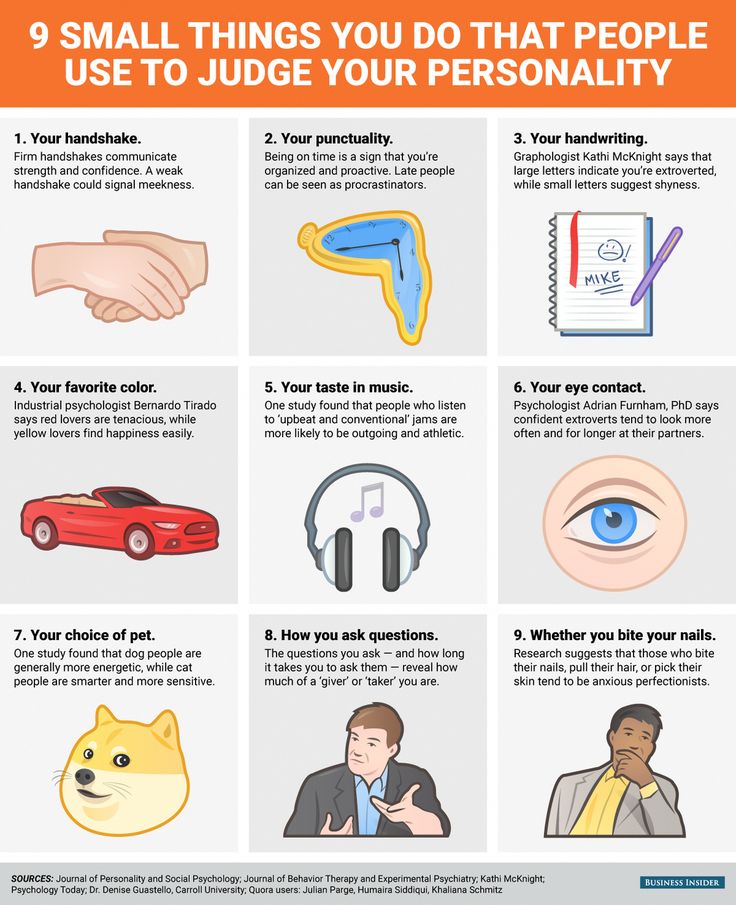 Move at your own pace: if the chosen activity doesn’t fit, go back to the list and try the next one.
Move at your own pace: if the chosen activity doesn’t fit, go back to the list and try the next one.
Do not pursue the Great Goal. The main thing is to fill life with meaning that corresponds to your desires.
6. “What if I can't take compliments? When I am praised, I laugh it off or change the topic.”
Our reaction to compliments is a reflection of our self-esteem. And if self-esteem is underestimated, then a compliment causes an internal contradiction in us. It provokes discomfort. It is not at all necessary that you have low self-esteem in general - it is possible that it is deficient in specific areas. Think about it: do you feel embarrassed to accept compliments all the time or under certain circumstances, from certain people? Perhaps their age, gender, status somehow influence. Analyze it - you will discover a lot of interesting things!
Simple but effective self-esteem advice: Write a list of your good qualities. When we write such lists, the neurons in the head line up in a certain way, and after, when we hear a compliment, the brain remembers what was written down and we are no longer surprised by the praise: after all, we ourselves think the same way about ourselves.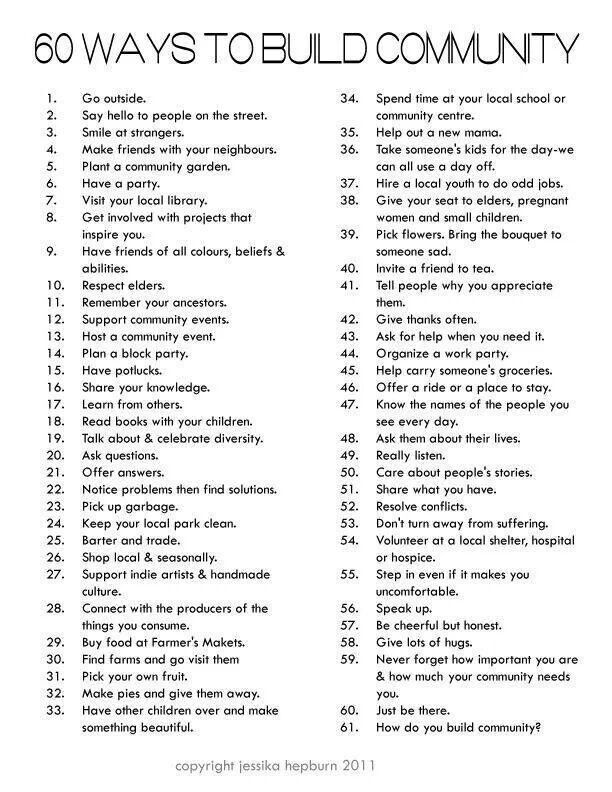 And that means there will be no awkwardness.
And that means there will be no awkwardness.
7. “I noticed that for different people I have different behavior patterns. So I'm a hypocrite?"
Good news: most likely you have high social intelligence - the ability to recognize the emotions of others and behave in accordance with the situation. Each of us has a different social role for different people (for example, no one communicates with mom like with a boss, and with a boss like with a girlfriend in a cafe). But the higher the social intelligence, the more such roles it can cover. This is an advantage, not a disadvantage! The main thing is that neither other people nor you suffer from your actions. Listen to yourself whether you are comfortable in these social roles - it will be easier to separate your real self from these roles.
8. “How to overcome everyday laziness? At home it is often so untidy that it is even embarrassing to invite guests.”
Think about the reasons for laziness. Often, household chores are perceived as boring and monotonous - for the most part, they are. But the reality is that it is necessary to do boring things from time to time. And this does not mean at all that there are no ways to diversify the process.
Often, household chores are perceived as boring and monotonous - for the most part, they are. But the reality is that it is necessary to do boring things from time to time. And this does not mean at all that there are no ways to diversify the process.
- Find the benefits of cleaning: more physical activity, less anxiety and guilt, cleaner air and better selfies.
- Have music, a podcast or an entertaining video playing in the background.
- Call your relatives or friends who you didn't have time to contact, put the call on the speakerphone - and go!
- At the end, reward yourself with an hour of complete idleness with a sense of accomplishment.
After a few of these cleanings, you'll get hooked, I assure you!
9. “I'm constantly lying to everyone with or without reason, without noticing it myself. How to get rid of this habit?
It is important to understand where this habit came from. What truth are you running from and why? Maybe something in your life does not suit you, are you ashamed of something? Or do you feel that the truth is not interesting enough to share it with others? Think and you will find the answer. And remember: if you do not want to report any information, you have the right not to report it! Instead of lying, for example, you can gently translate the conversation.
And remember: if you do not want to report any information, you have the right not to report it! Instead of lying, for example, you can gently translate the conversation.
10. “How can I help myself if my soul is anxious, and all the sedatives have already been drunk?”
It is important to find out what is the cause of your anxiety, since medicines, including herbal ones, are not a solution to a problem, but a way to get rid of its symptoms. We do not worry just like that, for no reason - there is an explanation for any feeling. And here it is important to consider that we cannot always help ourselves, without outside help. Long and unsuccessful attempts to cope alone with such a condition can lead to unpleasant consequences like panic attacks. Save yourself, contact a psychologist who, if he sees the need, will refer you to the right specialist. Be healthy!
11. “I'm pretty successful, but I still don't believe in myself.
 Can this uncertainty be dealt with?”
Can this uncertainty be dealt with?” Self-esteem, oddly enough, does not always depend on real achievements. Low self-esteem just gives rise to a feeling of insecurity, fear of failure in the future. It consists of two aspects: cognitive (your knowledge about yourself) and emotional (a measure of self-satisfaction) .
Where can your insecurity, that is, a violation of the emotional aspect of self-esteem, come from?
- Family upbringing: how often were you praised and scolded? what values were instilled?
- Pedagogical impact: how did you learn and how did your parents, teachers, peers feel about it?
- Social environment: what attitudes and principles do people close to you have?
We come into adulthood with a lot of attitudes and words spoken to us earlier. You need to analyze your past: what people could influence you, who supported you and how? Look also in the present: who surrounds you now? what do you hear about yourself? It is possible and necessary to fight uncertainty: it will give you the necessary resource to move forward.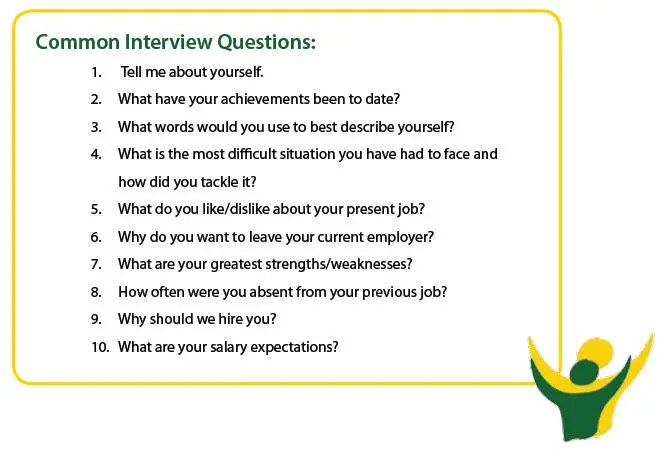
12. “How to overcome telephone addiction? I spend whole days aimlessly scrolling through Internet pages”
Any habit can be eradicated. But for this, decide for yourself why you need it and what benefits it will bring to you. Imagine it in colors, get inspired and make up a couple of rules, for the violation of which you would be ashamed of yourself. For example, these:
- Do not take your phone with you to the toilet (yes, yes!), but put a magazine, reference book or encyclopedia there - something that you can open on any page and read, learning something interesting.
- Do not touch your phone for an hour after waking up. Instead, drink water, exercise, clean up. And the reward for this will be the opportunity to use the phone.
- Before going to bed, smear your hands with a thicker cream and, without any gadgets, comprehend the past day in silence.
- With an effort of will, unsubscribe from at least half of the useless publics, and in return for them, subscribe to useful and informative ones.
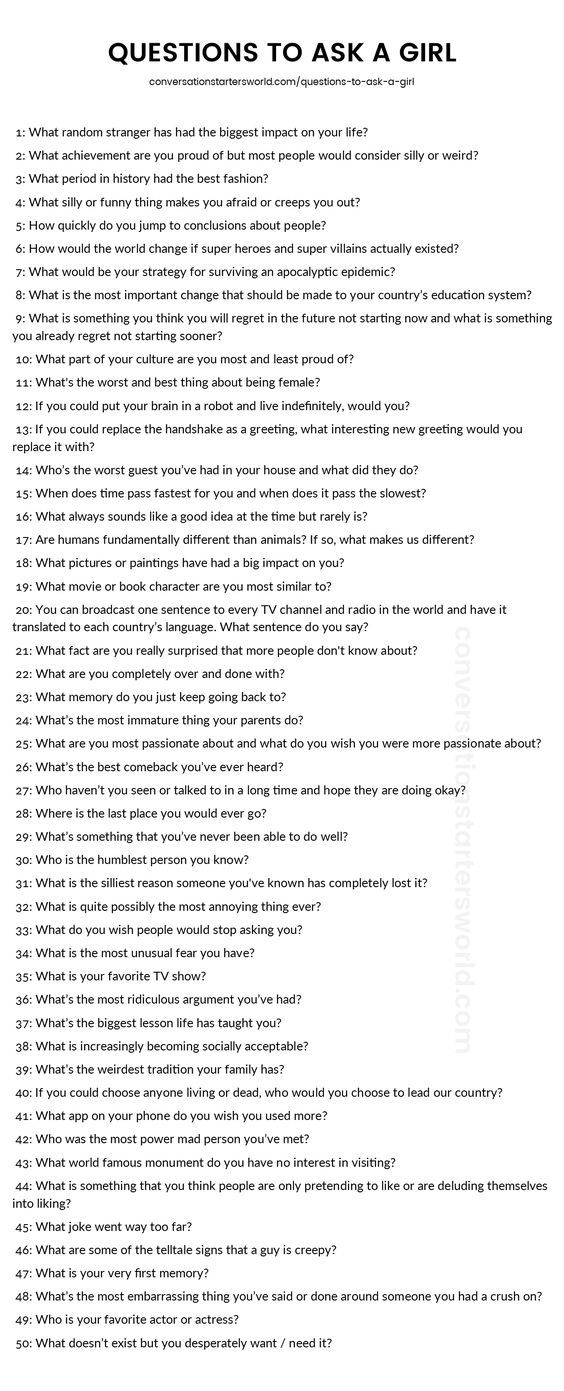 This will definitely reduce the time spent watching the feed - verified!
This will definitely reduce the time spent watching the feed - verified!
13. “People close to me died, but I don't feel anything. Is it okay that I'm not sad?"
We hear from childhood that we should or should not experience this or that feeling in certain circumstances. But people cannot react in the same way to everything: if only because they have different temperaments and sensitivity thresholds. We also have strong defense mechanisms that, at the moment of grief, can block the manifestations of bitterness of loss. Sometimes we forbid ourselves to experience, put off feelings for later, and they remain unexpressed. This is not very good, it is better to throw out emotions right away: let them not be traditional tears, but laughter, screaming - the main thing is not to keep everything in yourself.
If you ask yourself this question, you can't say that you don't feel anything. Most likely, you feel shame, fear of being "abnormal". Let go of that thought, don't judge yourself. And then you can understand how you really feel.
Let go of that thought, don't judge yourself. And then you can understand how you really feel.
14. “My wife and I recently had a baby, but I don't feel love for him. Am I a bad father?"
After the birth of a child , every 10th mother feels fear of a new chapter in her life - and this is due to the so-called maternal instinct. What can we say about fathers! In addition, as a rule, the young parent keeps this a secret, suffering from feelings of inferiority in a new role. There is a stereotype in our culture that parents should unconditionally adore their baby almost from the day of conception. And this cultural pressure spoils the lives of new mothers and fathers. Dads, feeling responsible, afraid to do something wrong, often distance themselves from the child, and consciousness blocks feelings - that's why it seems that there are no feelings. All this in no way means that you are a bad father. Just don't compare yourself to the mythical norm, take care of the baby and love will come.
15. How to stop yelling at your children? I feel like I'm becoming like my cruel mother.”
First of all, relax: there are no perfect parents. But we need to move in this direction. You realize that you are acting incorrectly - you can be praised! And now make up for yourself a system of rules and punishments for such breakdowns. Imagine how your behavior can harm the development of children - you do not want this, do you?
The key to solving the problem is your relationship with your mother. Try to talk to her about your childhood and honestly discuss how it was for you, how you felt at the moments of her breakdowns. Accept the fact that you project the image of your mother onto yourself, that is, you equate yourself with her. Make a list of her good qualities and try to adopt them, periodically refreshing the list in your head.
16. “I often break my promises to my son for various reasons. Will this somehow affect his psyche?
Actually, yes, it can be reflected in a very unpleasant way. Double standards, which a child often has to face in childhood, undermine the fragile psyche and can become one of the causes of schizophrenia at a later age.
Double standards, which a child often has to face in childhood, undermine the fragile psyche and can become one of the causes of schizophrenia at a later age.
But not everything is so bad: if you do not break promises regularly, do not scold the child for what you yourself allowed him to do, then there will be no such deplorable consequences. However, it is worth remembering that we adopt the habit of keeping a word from our parents, and this is a rather important social skill. So find the courage to be honest with yourself and with your child. If you are not sure that you can buy or make something, just say: "I will try, but I cannot promise."
17. “I am tormented by dreams in which I cheat on my husband. Is this a wake-up call or does it happen to everyone?”
Based on the theory of Sigmund Freud, under the "masks" of different people, you can dream of a completely different person. Including your own husband. Yes, it's amazing, but this is how the mechanism of censorship works in our subconscious. Think about your dream like a puzzle, look at it from different angles. What are your thoughts? Maybe you do not have enough warmth and affection from your husband? Do you want your husband to be jealous? Do you have any fantasies that you are embarrassed to talk about? Make hypotheses and your consciousness will answer you. The more resistance this or that assumption causes, the more intensively dig in this direction: is a signal from the deep layers of your psyche.
Think about your dream like a puzzle, look at it from different angles. What are your thoughts? Maybe you do not have enough warmth and affection from your husband? Do you want your husband to be jealous? Do you have any fantasies that you are embarrassed to talk about? Make hypotheses and your consciousness will answer you. The more resistance this or that assumption causes, the more intensively dig in this direction: is a signal from the deep layers of your psyche.
18. “I don't want to ever get married. This is fine? And is it okay not to want children?”
Absolutely normal. Cultural norms and traditions are transformed over time, but the fear of not conforming to stereotypes remains. Everything that pleases you and does not harm others is normal. Try to answer the question why you don't want to get married. If this is not a fear of failure, not disappointment in the institution of marriage and motherhood, but your conscious position, then you have every right to it.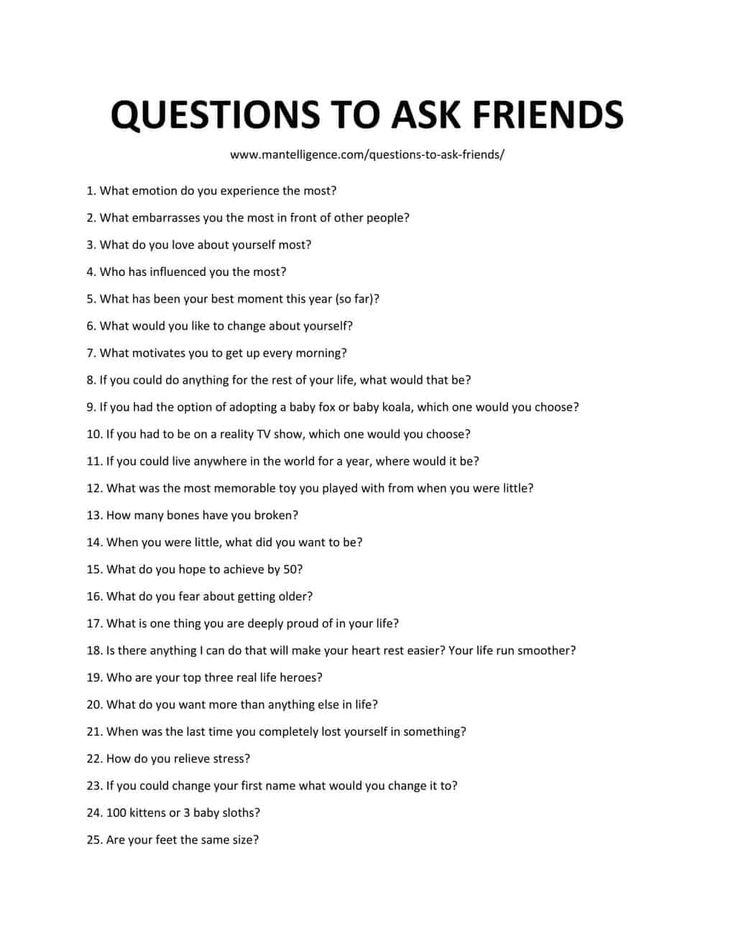
19. “Can a psychologist really help? He's not even a doctor!"
True, maybe. But it is important to know the difference between a psychologist and a psychotherapist. Psychologists can diagnose and advise. And psychotherapists are those who intervene in the psyche in order to help. In any case, both those and other specialists are needed: the soul can also get sick and need help.
20. "Psychologists have their own psychologists. So they can't support themselves?
Passing through the problems and stories of different people is not an easy job, because the internal resource can be exhausted. Therefore, psychologists need supervisors - senior colleagues in experience. They help to look at the situation of clients with a fresh look, you can share your own experiences with them and get support. Mental hygiene is important for everyone, and we, psychologists, are also living people.
Universal advice: “What should I do if I feel that something is wrong with me?”
- Look for the reason for this feeling, think about it from different angles.



